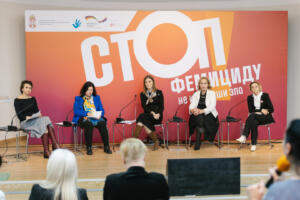Niš, 5 December 2023 – A gender-sensitive society also includes the fight against femicide, a term that refers to the killing of women solely because of their gender identity and often stems from deep-rooted gender inequalities and patriarchal norms. In societies that strive to achieve gender sensitivity, the objective is to recognise, condemn and prevent femicide, and this includes adopting measures that will strengthen legislation to protect women from violence and murder, improving access to the judiciary for victims of violence, as well as educating society about the seriousness of this problem. The Ministry of Human and Minority Rights and Social Dialogue launched the campaign “Stop femicide”, which includes a series of panel discussions aimed at raising awareness of this phenomenon, which is also present in Serbia. Within the framework of the German Development Cooperation project “Support to Social Inclusion in Serbia”, implemented by Deutsche Gesellschaft für Internationale Zusammenarbeit (GIZ) GmbH, discussions on the topic of femicide were held in Belgrade, Kragujevac, Novi Sad and Niš, which included representatives of all sectors of society, the government, civil society organisations, private sector, the media and individuals.
Dušica Davidović, Deputy Mayor of the City of Niš, pointed out the following, “In 2005, we as the City recognised the problem that arose at that time. We had 25 women reporting violence on a monthly basis. For this reason, we opened a Shelter for women and children, victims of domestic violence, and in 2011 we opened the first Safe House. Thanks to the Ministry, we equipped the space and started working, and, unfortunately, that space was never empty, which proves that domestic violence exists. Women may have become a little more empowered to report violence, but not enough, perhaps because of the patriarchal upbringing, it is still a shame to talk about violence, and this is still present somewhere in the consciousness and upbringing of our women in this part of Serbia. We are the first city in Serbia to open a counselling centre at the Safe House for children suffering from domestic violence, and we created a plan and programme to explain to children – in a way that they can understand – the potential danger of all forms of violence. It is necessary to raise the level of awareness among all of us to report violence and not to remain silent about it.”

Prevention of femicide involves providing support to victims, empowering women to recognise and react to danger signs, and empowering the entire society to actively contribute to creating a safer environment for all citizens, regardless of gender. This is part of a broader effort to build an inclusive and just society where violence against women is unacceptable and where victims truly feel protected.
Nina Mitić, Assistant Minister of Human and Minority Rights and Social Dialogue explained, “The Ministry is trying to point to a serious problem in our society, a problem that affects not only Serbia, but the whole world. Also, we are here to help other institutions to find the adequate legal framework, to speed up the proceedings. Time is the most important thing from the moment violence occurs, it is necessary for institutions to react faster and better. What we noticed is that we do not have public registers for domestic violence perpetrators, there is a register, but it is not public, that would really help us a lot, that is why we are asking for the acceleration of proceedings and tightening of measures, and we appeal that it is necessary to improve our legislative framework”.
A gender-sensitive society seeks to change norms and values that contribute to violence against women. This includes working to eliminate stereotypes about gender roles, strengthening education about gender equality and promoting a culture where all citizens are free from the fear of violence.

Jelena Janićijević, Head of Department in the Cabinet of the Nišava Administrative District explained, “We have gathered here to deal with a topic that has a terrifying name. Femicide and violence against women are frightening phenomena in society that we are facing, and many of us cannot even imagine the consequences of this phenomenon. I am glad that I can give my personal contribution on behalf of the Nišava District by participating at this event. I am sure that during the panel discussion we will touch upon many aspects of femicide and violence against women in our country. We will deal with numbers, statistics and how to reduce the number of potential victims as efficiently as possible, because no matter how much effort we put into the prevention of violence, it still happens.”
Robert Bu, team leader of the German Development Cooperation project “Support to social inclusion in Serbia”, pointed out that 27 women were killed by men this year, and that it is estimated that 300 women were killed by men over the past 10 years.
“The “Stop femicide” campaign was launched on 24 November in Belgrade. After that, a panel discussion was held in Kragujevac and Novi Sad. Today we are in Niš, and on 11 December in Novi Pazar. Combatting violence against women and domestic violence should bring all of us together, public administration bodies, the academia, the media, civil society organisations, victims of violence, perpetrators of domestic violence, but also all other citizens. Violence against women and femicide require daily attention, commitment, perseverance, not only during the “16 days of activism to prevent violence against women”. The GIZ, in cooperation with the Ministry, will continue to work in this area over the next two years and will implement other activities in the area of anti-discrimination and gender equality and women’s empowerment,” Robert Bu concluded.






